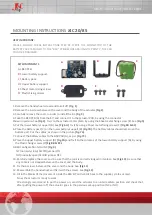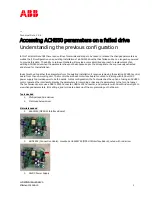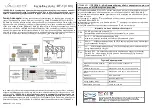
93
VERIFYING LOAD CELL FUNCTION
Most Problems are related to LOAD CELL function.
There are several ways to VERIFY that the load cells are functioning properly. The slightest touch
on the weigh bin should result in a change in the readout. If this is not the case, something is
wrong. When the light touch is removed, the display should return to its starting point. If this does
not happen, something is interfering with free movement of the cell or the bin. Make a careful
inspection of EVERYTHING around the load cells, the hanger bolts, the weigh bin tray and the
weigh bin. NOTHING should interfere with free movement.
It is normal for load cell readout to drift several grams over time and with different
temperatures. Since all the component dispenses are weighed by a single set of
load cells, this drift will affect all components equally and, therefore, the ratio of
the components will remain accurate. Empty weight is always TARED so each
dispense is accurately measured.
The following observations will verify proper load cell operation:
When the bin is empty, between cycles, the display should read near zero. An error of several
grams is not important since this empty weight reading is "tared" at the start of a cycle. The
"empty weight" readings should be consistently within 1 or 2 grams of each other.
The addition of several pellets to the weigh bin should result in a change in the readout. 1 gram is
about 40 pellets.
Most load cell problems are caused by interference to the movement of the load cell. The load
cell must be free to respond to the weight of a single pellet as well as free to move far enough to
record a full 20,000 gram weight deflection. (10,000 grams per cell - 10K cells)
If weight readout is very erratic check for damage to the load cell wires. Check for a pinched wire
in the connector.
An over stressed load cell will read high. The top limit is 3100.0 for a 200 series or 31000 for a 400
or 900 series. A load cell that was forced or pried upward too far will read 0.0.
We supply and replace load cells in matched sets and we always include the mounting
enclosures. You may remove the back plate from the enclosure for visual inspection. It is not
safe to remove the load cell itself from the enclosure. To do so may stress the cell itself.
To OPERATE with DAMAGED load cells in a VOLUMETRIC mode, see Volumetric Operation on
page 68.
To RECALIBRATE the LOAD CELLS, see the Load Cell Recalibration on page 68.
If you suspect load cell damage or failure, see: LOAD CELL RAW SIGNAL READOUT.
Summary of Contents for FLEXBUS Lite
Page 6: ...6...
Page 10: ...10 Blender Parts Key...
Page 13: ...13...
Page 100: ...100 Technical Drawings...
Page 101: ...101...
Page 102: ...102...
Page 103: ...103...
Page 104: ...104...
Page 105: ...105...
Page 106: ...106...
Page 107: ...107...
Page 108: ...108...
Page 109: ...109...
Page 110: ...110...
Page 111: ...111...
Page 112: ...112 FCA INSTALLATIONDIAGRAM...
Page 113: ...113 WSB 4088 IO wiring diagram 120V...
Page 114: ...114 D WSB E0001 Electrical Diagram WSB Export Single Phase...
Page 115: ...115 D WSB E0002 Electrical Diagram WSB Export 3 Phase...
Page 116: ...116 D WSB E0003 Electrical Diagram WSB Export 1800 3 Phase...
Page 117: ...117 D WSB E0004 Electrical Diagram WSB Export Maxibatch...
Page 118: ...118 D WSB P0001 Pneumatic Diagram WSB with Non Removable Hoppers...
Page 119: ...119 D WSB P0002 Pneumatic Diagram WSB with Removable Hoppers...
Page 120: ...120...
Page 138: ...138 Flexbus Lite Wiring Diagrams...
Page 139: ...139...
Page 140: ...140 Flexbus Lite Component Map...
















































